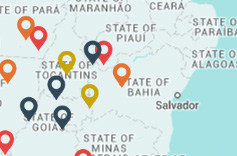On Monday, November 27, the Museum A Casa do Objeto Brasileiro, in São Paulo, was the setting for a relevant event for the cause of climate justice in Brazil. The Brazil Fund for Human Rights launched Raízes – Indigenous Peoples and Local Communities Fund for Climate.
Justice, an initiative to strengthen indigenous peoples and traditional communities to defend their rights, territories, and natural resources, and thus decisively contribute to the regulation of the planet’s climate.

The event brought together distinguished guests whose voices play a crucial role in promoting the rights of forest, rural, and water communities. Alessandra Korap Munduruku, from the Pariri Indigenous Association, highlighted the importance of land rights for preserving the Amazon forest: “For us, the right to land is the basis for protecting the forest.”
Josefa Oliveira, from the Ribeirinho Council and Xingu Vivo Forever Movement, shared the injustices riverside communities face: “The invasion of our lands for mega-projects has driven us out of our territories, making climate justice an urgent issue.”
Marileia Passos, from the Mangabeira Community Association and Neighboring Villages, emphasized the importance of collective action: “We live collectively, which allows us to preserve the environment and local cultures.”
Gersem Baniwa, counselor to the Brazil Fund, emphasized the essential mission of the Raízes: “It is a working experience that seeks to highlight an important segment of the Brazilian population – indigenous peoples and traditional communities, historically excluded from policies and rights. It represents a fundamental step in promoting climate justice.”
Justice will grant at least USD 1 million over the next 3 years to strengthen grassroots organizations aiming to protect their rights, territories, and natural resources. The first step in this commitment is the launch of the Traditional Communities Fighting for Climate Justice call for proposals, which will grant USD 200,000.00 to 20 projects from traditional communities.

Traditional Communities Fighting for Climate Justice call for proposals
The current scenario in Brazil reveals the worsening impacts of climate change with increasing intensity. The historic drought in the Amazon, torrential rains in the South, and extreme heatwaves are just a few recent events that disproportionately affect different regions of the country, imposing hunger, isolation, destruction, and losses on the most vulnerable segments of the population.
Raízes launched its first call for proposals to address these challenges, with submissions open until January 31, 2024. The Traditional Communities Fighting for Climate Justice call for proposals marks the first step in this commitment.
Ana Valéria Araújo, Executive Director of the Brazil Fund, highlighted the importance of the Fund’s 17-year experience supporting community groups and civil society organizations in all regions of the country. “Our work is based on continuous listening to groups directly facing inequalities and injustice. Our methodology ensures Raízes an efficient approach to supporting communities who most need it.”

Traditional communities play a fundamental role in promoting climate justice, as their ways of life are intrinsically linked to ecosystem protection and sustainability. The definition of traditional communities in Brazil encompasses dozens of culturally distinct groups, characterized by their own forms of social organization and a deep and respectful relationship with their territories and natural resources.
Among these groups are andirobeira gatherers, always-alive harvesters, caatinga dwellers, mangaba pickers, quilombolas, extractivists, riverside communities, caiçaras, gypsies, terreiro people, cipozeiros, chestnut gatherers, faxinal dwellers, pasture dwellers, hill and pasture enclosure dwellers, cerrado dwellers, islanders, fire starters, mountain dwellers, Pantanal dwellers, artisanal fishermen, piassaba gatherers, Pomeranians, babassu breakers, retreaters, rubber tappers, vazanteiros, and veredeiros.
Protection of indigenous, Afro-Brazilian, and traditional peoples and communities’ cultural manifestations is guaranteed by Article 215 of the 1988 Federal Constitution. However, these communities often face threats, violence, and persecution due to their struggle to preserve their lands and cultures.

In this context, the launch of Raízes – Indigenous Peoples and Local Communities Fund for Climate is an essential step to ensure that these communities have support to continue their fight for climate justice and preserve their cultural and territorial identities. The initiative not only recognizes the importance of these peoples in mitigating the impacts of climate change but also demonstrates a concrete commitment to ensuring their voices are heard, and their demands are met.
Climate justice is a global challenge that requires active participation from all sectors of society, governments, and organizations. The launch of the Raízes represents a significant step towards a more sustainable and equitable future for all.






